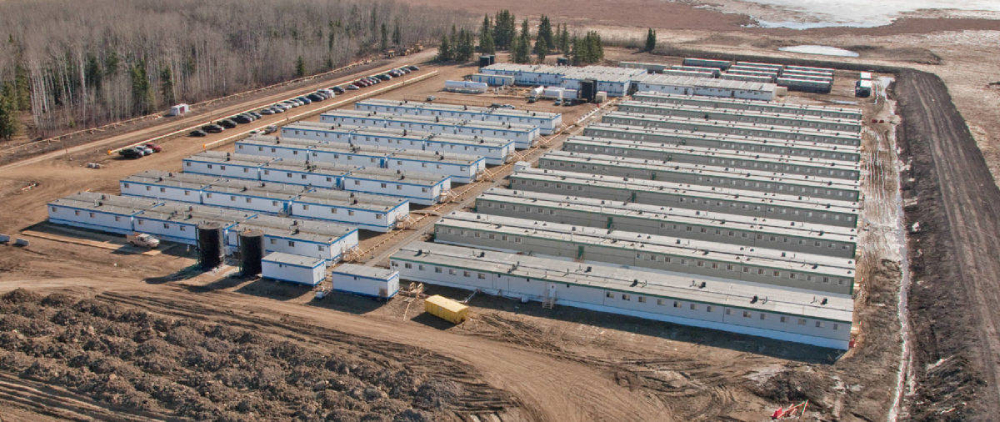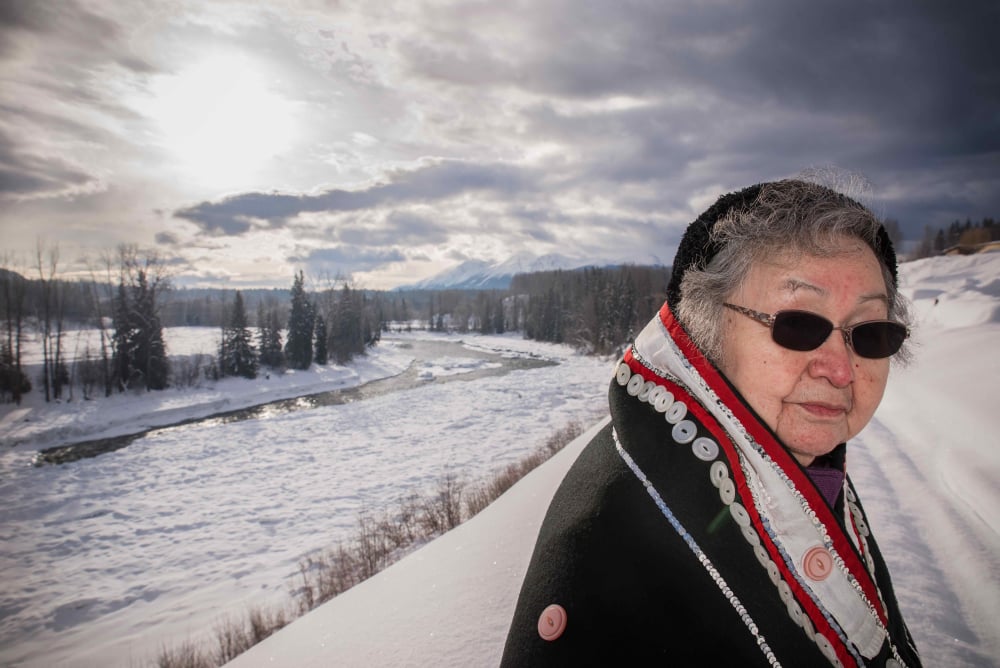Violet Gellenbeck, Kiliset, is an Elder and Ts’ako ze’, a female chief, who has barely left her home in the Wet’suwet’en community of Witset since March.
At 83, she’s taking the pandemic seriously. She’s given up her weekly Elders’ lunches and frequent meetings about language revitalization. Family dinners, birthdays, graduations and weddings are all on hold.
Most difficult, particularly this year, has been the inability to hold funerals. Instead, loved ones who pass are taken from the funeral home 35 kilometres away in Smithers directly to the cemetery.
“I’ve sat on the side of the road and cried as a car went by and I couldn’t hold the hands of the ones that were bringing that body home,” says Gellenbeck, a member of Laksilyu Clan and house of Kwin Begh Yikh. She says while the community works to curb transmission, work camps in the territory are making things worse as employees who test positive are sent back to their home communities.
Witset, with about 800 residents, is currently dealing with a dozen COVID-19 cases. Residents in this tightknit community say five of the cases originated at work camps for the LNG Canada plant in Kitimat and the Coastal GasLink pipeline camps closer to home. Those have led to spread of the virus within their community, they say.
That spread — the second cluster of cases there in recent months — began two weeks ago, around the time 22 Ts’ako ze’ wrote to provincial health officer Dr. Bonnie Henry expressing concerns about work camps continuing to operate on Wet’suwet’en territory during the pandemic.
Gellenbeck, one of the chiefs who signed the letter, says they’re still waiting for an answer.
“I’m dismayed,” she says. “I have watched her right from the beginning and I support her. She is a woman with great empathy for the people of B.C. I feel that she is educated and has the responsibility to do the job that she is doing as a provincial health officer. With that in mind, we had to send this letter to her.”
The Tyee tried — and failed — to get answers from the public health officer at Thursday’s pandemic briefing. In what she described as “one of the most tragic days we’ve had yet,” Henry reported 28 people had died from the virus on the previous day.
“All but two of these people are Elders and seniors who were in long-term care homes and various places across B.C.,” she said.
On Monday, the province reported 2,146 new COVID-19 cases over the previous three-day period, including 91 in the Northern Health region.
Isolation has also taken its toll on Elders during the pandemic. Gellenbeck says they check in on each other by phone and hold online church services twice a week. She says the Ts’ako ze’, considered the matriarchs of each family, have a role in making sure families are taken care of.
“Up to now, since before COVID, we haven't really spoken out publicly, because we support our hereditary house chiefs and they do the speaking in public for us. That's part of our law, that the hereditary house chiefs are the ones that speak out in public on our behalf,” she says.
“But as time went on, we saw a real need to gather as Ts’ako ze’ and begin to get involved in this whole pandemic that has engulfed the world. It was our job then to begin to protect our families. And that's where we’re at today.”
In their letter, Ts’ako ze’ representing the nation’s five clans expressed particular concern with three camps on Wet’suwet’en territory in Burns Lake, south of Houston and near the Unist’ot’en Healing Centre.
Gellenbeck says that many of the community’s current cases originated from two work camps: Coastal GasLink’s Huckleberry Lodge south of Houston and the LNG Canada camp in Kitimat, where an outbreak declared Nov. 19 reached 56 cases last week. On Friday, Northern Health Authority said only one case remained active.

In addition, Unist’ot’en Healing Centre near Coastal GasLink’s 9A Lodge reported last week on social media that the company has informed it of five cases at the work camp.
Gellenbeck says camp workers who test positive for the disease are sent home without consideration for who they live with or their ability to self-isolate.
“They just come back to their homes. It could be a home with only a couple. It could be a home where a couple has many children. It could be a home where there are two or three family members with children,” she says. “In most homes, we have Elders living. That’s my biggest worry is my peers. I’m in daily contact with them to ensure that they’re OK.”
When asked for details about how work camps respond to positive COVID-19 cases, the Ministry of Health said in an email that each has an approved COVID-19 safety plan based on the type and size of the camp. The ministry did not respond to more detailed questions about the process when a worker tests positive, whether consideration is given to their ability to self-isolate and followup procedures once workers are back in their home communities.
In an update posted to its website Thursday, Coastal GasLink said it is monitoring a cluster of nine COVID-19 cases within its workforce. It said it was first notified of the cases on Nov. 25.
“Our contractors and medical providers support workers in isolation and if separate quarters are not available on-site, alternative accommodations... are made available for individuals who need to isolate,” it said.
“Individuals who live locally must inform their employer if they return home to isolate so that they can travel safely and are required to follow all public health guidelines and instructions.”
The company cited privacy concerns when asked the location of the cases along the 670-kilometre pipeline route.
Anne Ketlo, a member of the Nadleh Whut’en First Nation three hours east of Witset, also wonders about the impact of work camps on her community. She lost a cousin to COVID-19 over the weekend and has multiple other family members struggling with the illness in Nak’azdli Whut’en and Fort St. James, a region where Northern Health Authority was reporting 40 active cases last week.
It’s unknown where the cases originated, but many community members travel between the Dakelh nations and camps in Burns Lake, Vanderhoof and Kitimat, all of which have had positive cases, Ketlo says.
“There’s no real monitoring happening,” she says. “There’s got to be an exit plan that should be properly executed by CGL. They’re releasing those possible [COVID-positive] members back into their communities and not sharing the status.”
The letter from the Wet’suwet’en Ts’ako ze’ was followed on Dec. 5 by a letter written by Ron Mitchell, Hereditary Chief Hagwilnegh, on behalf of the nation’s Dinï’ze, or male chiefs. Hundreds of health and social workers have also signed an open letter to Henry expressing concern about the camps. Last week, the Union of BC Indian Chiefs also called on the province to close the camps.
“We want them to shut down until the virus does not affect our people that are working in camp,” Mitchell says. “As hereditary chiefs, it’s our duty to look after our people.”
Mitchell has been going door-to-door in Witset with Victor Jim, Chief Wigidimsts’ol, for the last two weeks, checking in on the community and, in particular, 71 Elders who live there. He shares information about COVID-19 and translates the leaflets into the Wet’suwet’en language. While the info session takes about 25 minutes, he can easily spend an hour on their doorstep.
Many Elders just want to talk.
“They say that we’re the only ones that are coming to their house in a long time,” he says. “It’s hard for them. They have to stay home. Some of them, they do go for a ride to town, but they don’t get out of their vehicles, their children or grandchildren shop for them.”
He says the Elders share stories of the past, many recollecting time spent hunting and trapping on the territory, and talk about the bahlat — feasts held to celebrate or to grieve — which are currently on hold. Though the gatherings, which are central to the nation’s governance system, were outlawed until the early 1950s, Mitchell says the restrictions never stopped the community from holding them — only the Spanish flu pandemic, more than a century ago, did.
It’s been a difficult year for the tightknit community. In addition to the pandemic, Witset has lost what he describes as “too many” members to both natural causes and the opioid crisis this year. Many were Elders, a hit for a community where only three per cent of the population is fluent in the Wet’suwet’en language.
None of the deaths have been COVID-19 related, though the virus has taken a toll. Since September, 30 people — nearly four per cent of the community — have tested positive. During the initial outbreak, Mitchell spent two and half weeks going door-to-door, talking to Elders and encouraging community members to stay home.
It worked. Until late November, the community’s COVID-19 count was down to zero.
In recent weeks, that number has gone back up to 12 cases. Four have recovered. Three people were hospitalized, spread between Terrace, Prince George and Victoria. One has since been released.
“Knock on wood, we haven't lost anyone to COVID,” Mitchell says. “The [Huckleberry work camp] up on our territory, that is our concern. They sent others home to their families. After they got home is when they found out that they had the virus.”
While band councils along the pipeline route signed agreements with Coastal GasLink, Wet’suwet’en hereditary chiefs have long expressed concern about the impacts of the project on their communities. Tensions came to a head in January, when the chiefs closed the Morice West Forest Service Road, blocking access to a portion of the pipeline route and the site of 9A Lodge work camp.
The standoff led to the arrest of 28 Wet’suwet’en land defenders and supporters over five days in February.
Those who oppose the pipeline point to environmental and cultural impacts, as well as concerns about the high number of missing and murdered Indigenous women, something that has been linked to work camps. Last year’s final report of the National Inquiry into Missing and Murdered Indigenous Women and Girls dedicated a chapter to resource extraction projects and their impact on Indigenous women.
“We also talked about disease, such as what we’re going through right now, and it seems to me today that everything that our women have stood for has been ignored,” Gellenbeck says.
She adds that the province has an obligation under the Declaration on the Rights of Indigenous Peoples Act, which was passed last year, and points to the recently released findings from an independent investigation showing widespread racism within B.C.’s health-care system as evidence that the province should be better protecting Indigenous communities.
Gellenbeck emphasizes that she isn’t opposed to development. She worked as an economic development officer and her family has benefited from the local resource economy.
“But what has happened in the last few years is that the government and big business has ignored the people. They have ignored the First Nations people who live on the land, and they have the rights and title to manage that land,” she says. “The Wet’suwet’en chiefs stated that there will be no pipelines on our territories. That decision has not changed.”
Gellenbeck says she trusts the science and the province’s decision-makers — when the vaccine comes out, she’ll be one of the first in line, determined to live a long and healthy life.
“I want to live the rest of my life. I have to trust the scientists. I have to trust the doctors, decision-makers, I have to put my trust in that,” she says.
But she’d still like to hear back from the public health officer.
“Just tell us, yes, I received your letter. Yes, I am working on it. Yes, I will be in touch with you,” she says. “That’s the least you expect.” ![]()
Read more: Coronavirus
















Tyee Commenting Guidelines
Comments that violate guidelines risk being deleted, and violations may result in a temporary or permanent user ban. Maintain the spirit of good conversation to stay in the discussion.
*Please note The Tyee is not a forum for spreading misinformation about COVID-19, denying its existence or minimizing its risk to public health.
Do:
Do not: